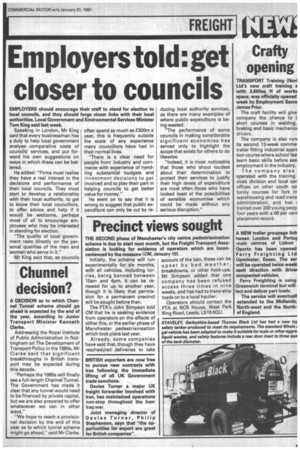Employers told: get closer to councils
Page 17

If you've noticed an error in this article please click here to report it so we can fix it.
EMPLOYERS should encourage local councils, and they should authorities, Local Government a Tom King said last week.
Speaking in London, Mr King said that every businessman has a duty to help local government analyse comparative costs of councils' services, and put forward his own suggestions on ways in which these can be bettered.
He added: "Firms must realise they have a real interest in the decisions and performance of their local councils. They must start to develop a relationship with their local authority, to get to know their local councillors, to offer advice and help if it would be welcome, perhaps most of all to encourage employees who may be interested in standing for election.
"The quality of local government rests directly on the personal qualities of the men and women who serve in it."
Mr King said that, as councils often spend as much as £300m a year, this is frequently outside the scale of any experience many councillors have had in their normal lives.
"There is a clear need for people from industry and commerce with experience of handling substantial budgets and investment decisions to get involved and to play their part in helping councils to get better value for money."
He went on to say that it is wrong to suggest that public expenditure can only be cut by re ducing local authority services, as there are many examples of where public expenditure is being wasted.
"The performance of some councils in making considerable significant economies has served only to highlight the scope that exists for others to do likewise.
"Indeed, it is most noticeable that those who shout loudest about their determination to protect their services to justify their high levels of expenditure are most often those who have looked least at the possibilities of sensible economies which could be made without any serious disruption."




























































































